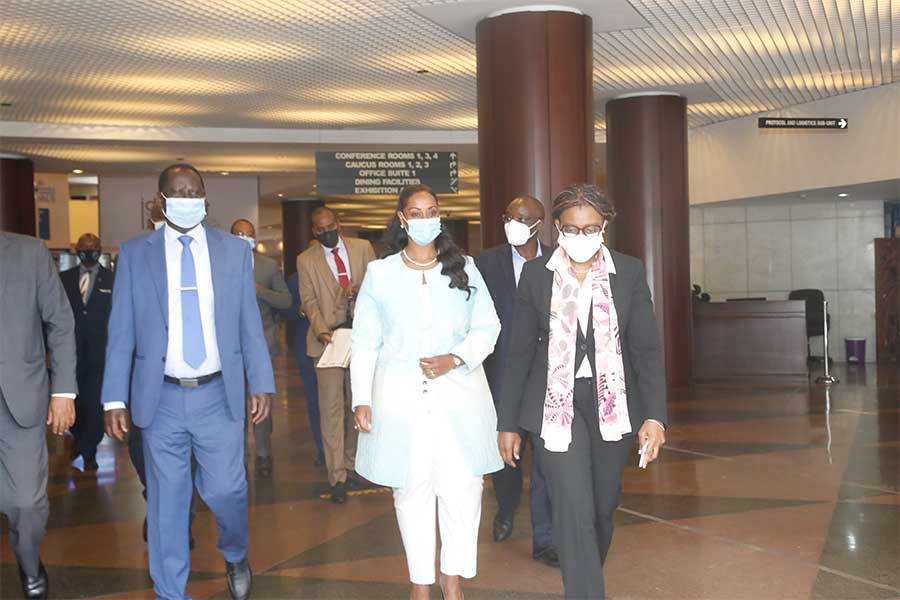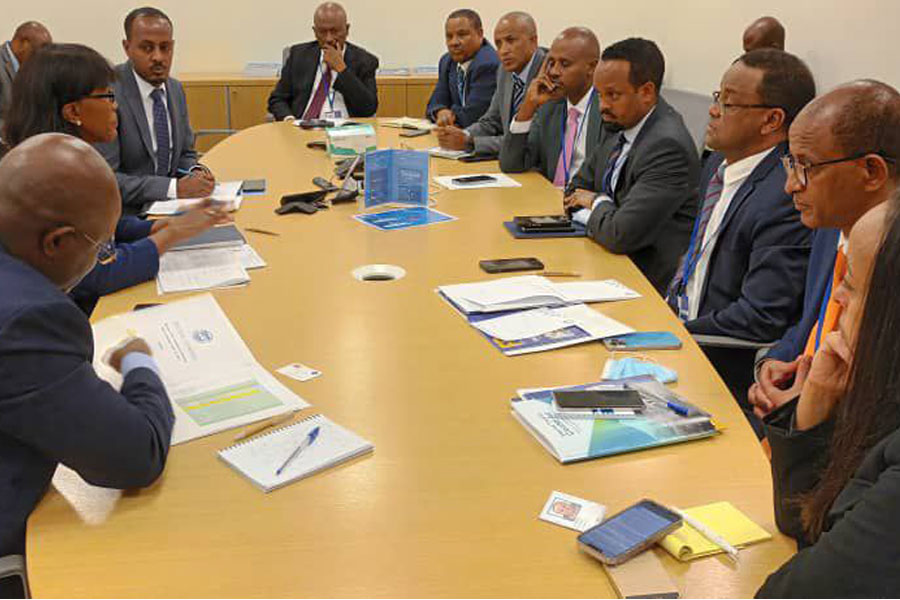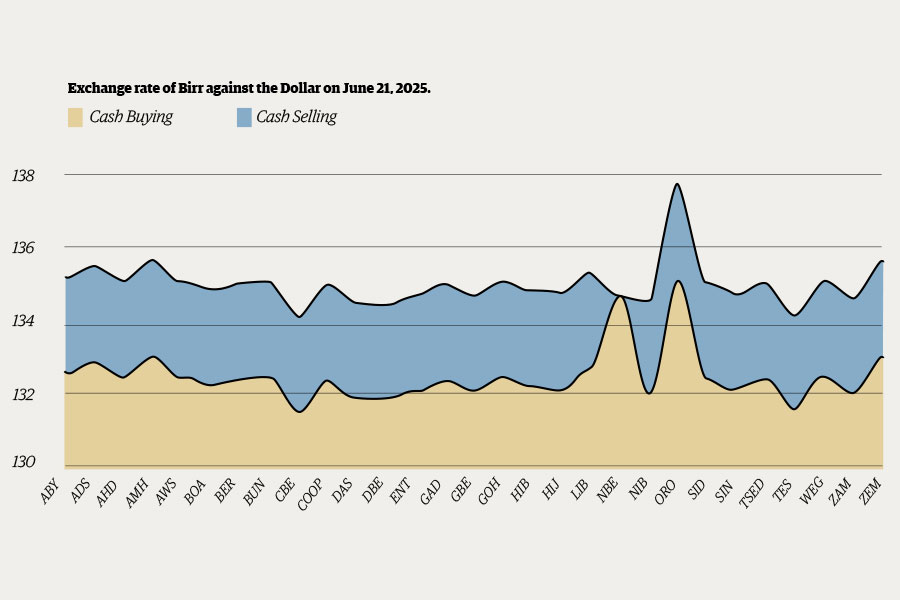
Radar | Jul 03,2021
The Ethio-Djibouti corridor plagued by deteriorated road quality and security concerns has impacted the annual economic gains of the country by up to 5.6 billion Br, according to a study by Ethiopian Logistics Sectoral Association (ELSA).
While insufficiency of road networks, safety concerns and expensive maintenance was ubiquitous, some routes were cited as being uniquely dangerous to both trucks and drivers. The 143Km Dikhil to Galafi road has up to two-meter high gravel chipped off by flooding, leading to serious damage to the trucks all the while fearing for physical safety.
The study included 75 completed surveys where three-quarters of the truck owners and drivers rated the route as in terrible condition, with 55pc of the trucks facing heavy but repairable damages while 38.7pc were damaged beyond repair.
Respondents indicated the absence of parking spots led them to be exposed to violent criminals while being required to pay as much as 600,000 Br for towing services.
The staggering revelations were made during a workshop by the Association last week at the Inter-Luxury Hotel, where lively debates and arguments from both government and private actors ensued.
"The logistics sector is plagued with political infringements," said Tsedeke Woldu, the chairperson of the Ministry Transport & Logistics Service Provision Council.
He noted that the problem goes beyond the deterioration of road infrastructure, recommending the private sector's deep involvement as a crucial, pivotal point to diffuse logistics issues that come with political upheavals.
To that end, a shift towards more reliance on railway transport and greater regional integration was cited as essential by the Chairperson.
Over 12,000 truck drivers make the hedge to the corridors every day as landlocked Ethiopia uses Djibouti ports primarily for international trades, where more than 95pc of the country's import-export transits.
Dereje Legesse, secretary general of the Ethiopian Transport Employer's Federation highlighted that most operational freight trucks have been serving for several decades, barely hanging on with outdated spare parts.
He stressed that investments in freight vehicles are important indicating that informal illicit payments could cost a driver up to a million Birr on one trip.
"The revenue is basically lost on the road," he said.
Poor infrastructure and inefficient border management have created opportunities for administrative corruption which in turn increases transaction costs and lengthens delays, according to Dereje.
The re-establishment of a new Ethiopia-Djibouti Management Authority that oversees the overall road infrastructure was applauded by logistics researcher Mathiwos Ensemu (PhD).
He outlined the possibility of a joint investment scheme through which maintenance, monitoring, and control could be done under the Authority, signalling the necessity of digitising cargo tracking, and monitoring transits and corridors.
While advancing railway operation, Mathiwos indicated the concurrent development of alternative ports.
"Looking out for other strategic ports could be of use," he said.
The vast amount of resources required to fully address the problems in the corridor is deemed too heavy by industry insiders.
Former Deputy Head of Maritime Authority, Mekonen Abera, pointed out that transparency issues at the federal level combined with the absence of an autonomous oversight body lead to poor infrastructure.
He advised referring to long-term projections of risks and threats in the corridor completing his assessment with an impassioned declaration.
"If we say it is a priority, we need to act like it," he said.
Freight forwarders also chimed in, expressing anguish over constant conflict and bureaucratic languish through agencies.
"The problems have gotten so much worse over the years," said Dawit Tedla, general manager of Dolphin Transit & Shipping S.C. The Company was incorporated in 1998 with 24 million Br capital.
Commodities such as oil, wheat, and fertiliser, are robbed in plain sight while filing a police report has been uneasy, according to Dawit. He observed that the high-risk profile is causing insurance companies to shy away or demand enormous premiums.
"Their help has plummeted over the years," he ruefully stated.
Drivers who bear the brunt of the problem indicated that the unsafe state has compelled them to look for alternative jobs.
Tesfaye Aregawi is a driver who has restricted his route from the capital to Mojo town, Oromia Regional State. The last straw for Tesfaye was a nearly fatal experience on Metehara and Welenchiti roads.
"I had to find another means for my life's sake," said Tesfaye.
High-ranking officials from the Transport sector acknowledged the problems cited by the private companies.
Abdulber Shemsu, CEO of the Ethiopian Maritime Authority, indicated that road infrastructure, parking lot, and security issues are being given priority by the government, noting the strategic importance of the Djibouti ports.
While Abdulber disclosed that five hectares of parking lot are being developed in Dire Dewa City, he conceded to the cumbersome task saying, "All the problems cannot be solved overnight".
A similar sentiment was echoed by State Minister of Transport & Logistics Denge Boru, who disclosed that the 730 million dollar grant by the World Bank to revamp the Mieso-Dire Dewa route is a vital turning point to improve the logistics sector. He also advised every stakeholder to play an active role in helping the logistics sector.
Manager of the Association, Abenet Belay who has keenly observed the plights faced by the sector said that the route has no parking spaces, cafeterias or bathrooms.
"That's basically a violation of human rights," Abenet told Fortune.
PUBLISHED ON
Jul 29,2023 [ VOL
24 , NO
1213]

Radar | Jul 03,2021

Fortune News | Sep 19,2020

Radar | May 29,2021

Agenda | Oct 15,2022

Radar | Oct 12,2024

Commentaries | Jan 19,2024

Money Market Watch | Jun 21,2025

Radar | Aug 08,2020

Fortune News | Apr 22,2022

Radar | Oct 18,2025

Dec 22 , 2024 . By TIZITA SHEWAFERAW
Charged with transforming colossal state-owned enterprises into modern and competitiv...

Aug 18 , 2024 . By AKSAH ITALO
Although predictable Yonas Zerihun's job in the ride-hailing service is not immune to...

Jul 28 , 2024 . By TIZITA SHEWAFERAW
Unhabitual, perhaps too many, Samuel Gebreyohannes, 38, used to occasionally enjoy a couple of beers at breakfast. However, he recently swit...

Jul 13 , 2024 . By AKSAH ITALO
Investors who rely on tractors, trucks, and field vehicles for commuting, transporting commodities, and f...

Oct 18 , 2025
The political establishment, notably the ruling party and its top brass, has become p...

Oct 11 , 2025
Ladislas Farago, a roving Associated Press (AP) correspondent, arrived in Ethiopia in...

Oct 4 , 2025
Eyob Tekalegn (PhD) had been in the Governor's chair for only weeks when, on Septembe...

Sep 27 , 2025
Four years into an experiment with “shock therapy” in education, the national moo...